3,5-Di(2-pyridyl)pyrazole
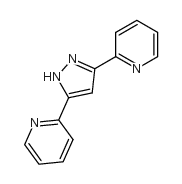
3,5-Di(2-pyridyl)pyrazole structure
|
Common Name | 3,5-Di(2-pyridyl)pyrazole | ||
|---|---|---|---|---|
| CAS Number | 129485-83-2 | Molecular Weight | 222.24500 | |
| Density | 1.248g/cm3 | Boiling Point | 476.5ºC at 760mmHg | |
| Molecular Formula | C13H10N4 | Melting Point | 188ºC | |
| MSDS | N/A | Flash Point | 270.3ºC | |
| Name | 3,5-Di(2-pyridyl)pyrazole |
|---|---|
| Synonym | More Synonyms |
| Density | 1.248g/cm3 |
|---|---|
| Boiling Point | 476.5ºC at 760mmHg |
| Melting Point | 188ºC |
| Molecular Formula | C13H10N4 |
| Molecular Weight | 222.24500 |
| Flash Point | 270.3ºC |
| Exact Mass | 222.09100 |
| PSA | 54.46000 |
| LogP | 2.53370 |
| Vapour Pressure | 8.77E-09mmHg at 25°C |
| Index of Refraction | 1.64 |
| InChIKey | IMDRKCUYKQQEAC-UHFFFAOYSA-N |
| SMILES | c1ccc(-c2cc(-c3ccccn3)[nH]n2)nc1 |
|
Section I.Chemical Product and Company Identification Chemical Name 3,5-Di(2-pyridyl)pyrazole Portland OR Synonym Not available. Chemical Formula C 13 H 10 N 4
CAS Number Not available. (International) Section II.Composition and Information on Ingredients Chemical NameCAS Number Percent (%)TLV/PELToxicology Data 3,5-Di(2-pyridyl)pyrazoleMin. 98.0 (T)Not available.Not available. Not available. Section III.Hazards Identification Acute Health Effects N o specific inform ation is available in our data base regarding the toxic effects of this m aterial for hum ans. H ow ever, exposure to any chem ical should be kept to a m inim u m . Skin and eye contact m ay result in irritation. M ay be harm ful if inhaled or ingested. A lw ays follow safe industrial hygiene practices and w ear proper protective equipm ent w hen handling this compound. Chronic Health Effects CARCINOGENIC EFFECTS : Not available. MUTAGENIC EFFECTS : Not available. TERATOGENIC EFFECTS : Not available. DEVELOPMENTAL TOXICITY : Not available. There is no know n effect from chronic exposure to this product.Repeated or prolonged exposure to this com pound is not known to aggravate existing medical conditions. Section IV.First Aid Measures Eye Contact C heck for and rem ove any contact lenses. D O N O T use an eye ointm ent. Flush eyes w ith running w ater for a m inim um of 15 m inutes, occasionally lifting the upper and low er eyelids. Seek m edical attention. Treat sym ptom atically and supportively. Skin Contact If the chem ical gets spilled on a clothed portion of the body, rem ove the contam inated clothes as quickly as possible, protectin g you r ow n h an ds an d body. Place th e victim u n der a delu g e sh ow er. If th e ch em ical tou ch es th e victim 's exposed skin, such as the hands: G ently and thoroughly w ash the contam inated skin w ith running w ater and non-abrasive soap. Be particularly careful to clean folds, crevices, creases and groin. C over the irritated skin w ith an em ollient. Seek m edical attention. Treat sym ptom atically and supportively. W ash any contam inated clothing before reusing. Inhalation If the victim is not breathing, perform artificial respiration. Loosen tight clothing such as a collar, tie, belt or w aistband. If breathing is difficult, oxygen can be administered. Seek medical attention. Treat symptomatically and supportively. Ingestion IN D U C E V O M ITIN G by sticking finger in throat. Low er the head so that the vom it w ill not reenter the m outh and throat. Loosen tight clothing such as a collar, tie, belt, or w aistband. If the victim is not breathing, adm inister artificial respiration. Exam ine the lips and m outh to ascertain w hether the tissues are dam aged, a possible indication that the toxic m aterial w as ingested; the absence of such signs, how ever, is not conclusive. Seek im m ediate m edical attention and, if possible, show the chemical label. Treat symptomatically and supportively. Section V.Fire and Explosion Data Auto-Ignition FlammabilityNot available. Combustible. Flash PointsFlammable Limits Not available. Not available. Combustion Products These products are toxic carbon oxides (CO, CO2), nitrogen oxides (NO, NO2 ). Fire Hazards No specific information is available regarding the flammability of this compound in the presence of various materials. Explosion Hazards Risks of explosion of the product in presence of mechanical impact: Not available. Risks of explosion of the product in presence of static discharge: Not available. No additional information is available regarding the risks of explosion. Fire Fighting Media SMALL FIRE: Use DRY chemicals, CO2, water spray or foam. and InstructionsLARGE FIRE: Use water spray, fog or foam. DO NOT use water jet. Continued on Next Page Not a3,5-Di(2-pyridyl)pyrazole Section VI.Accidental Release Measures Spill Cleanup In case of a spill and/or a leak, alw ays shut off any sources of ignition, ventilate the area, and exercise caution. U se a Instructionsshovel to put the m aterial into a convenient w aste disposal container. Finish cleaning the spill by rinsing any contam inated surfaces w ith copious am ounts of w ater. C onsult federal, state, and/or local authorities for assistance on disposal. Section VII.Handling and Storage Handling and Storage K eep aw ay from heat and sources of ignition. M echanical exhaust required. W hen not in use, tightly seal the container and store in a dry, cool place. A void excessive h eat and light. D O N O T breathe dust. In case of in sufficient ventilation, Information w ear suitable respiratory equipm ent. If you feel u nw ell, seek m edical attention and show the label w h en possible. Treat symptomatically and supportively. Avoid contact with skin and eyes. Always store away from incompatible compounds such as oxidizing agents. Section VIII.Exposure Controls/Personal Protection Engineering Controls U se process enclosures, local exhaust ventilation, or other engineering controls to keep airborne levels below recom m ended exposure lim its. If user operations generate dust, fum e or m ist, use ventilation to keep exposure to airborne contaminants below the exposure limit. Personal Protection Splash goggles. Lab coat.D ust respirator. Boots. G loves. A M SH A /N IO SH approved respirator m ust be used to avoid inhalation of the product.Suggested protective clothing m ight not be sufficient; consult a specialist BEFO RE handling this product. Exposure Limits Not available. Section IX.Physical and Chemical Properties Physical state @ 20°CSolubility White needle-like crystals. Not available. Specific Gravity Not available. Molecular WeightPartition Coefficient 222.25Not available. Boiling PointVapor Pressure Not available.Not available. Melting PointVapor Density 188°C (370.4°F)Not available. Refractive IndexVolatility Not available.Not available. Critical TemperatureOdor Not available.Not available. ViscosityTaste Not available.Not available. Section X.Stability and Reactivity Data Stability This material is stable if stored under proper conditions. (See Section VII for instructions) Conditions of Instability Avoid excessive heat and light. Incompatibilities Reactive with oxidizing agents. Section XI.Toxicological Information RTECS Number Not available. Routes of Exposure Eye contact. Inhalation. Ingestion. Toxicity Data Not available. Chronic Toxic EffectsCARCINOGENIC EFFECTS : Not available. MUTAGENIC EFFECTS : Not available. TERATOGENIC EFFECTS : Not available. DEVELOPMENTAL TOXICITY : Not available. There is no know n effect from chronic exposure to this product.Repeated or prolonged exposure to this com pound is not known to aggravate existing medical conditions. Acute Toxic Effects N o specific inform ation is available in our data base regarding the toxic effects of this m aterial for hum ans. H ow ever, exposure to any chem ical should be kept to a m inim u m . Skin and eye contact m ay result in irritation. M ay be harm ful if inhaled or ingested. A lw ays follow safe industrial hygiene practices and w ear proper protective equipm ent w hen handling this compound. Continued on Next Page 3,5-Di(2-pyridyl)pyrazole Section XII.Ecological Information Ecotoxicity Not available. Environmental Fate Not available. Section XIII.Disposal Considerations Waste DisposalRecycle to process, if possible. C onsult your local or regional authorities. You m ay be able to dissolve or m ix m aterial w ith a com bustible solvent and burn in a chem ical incinerator equipped w ith an afterburner and scrubber system . Observe all federal, state, and local regulations when disposing of this substance. Section XIV.Transport Information DOT Classification Not a DOT controlled material (United States). PIN Number Not applicable. Proper Shipping Name Not applicable. Packing Group (PG) Not applicable. DOT Pictograms Section XV.Other Regulatory Information and Pictograms TSCA Chemical Inventory T h is p r o d u c t is NOT o n t h e E P A T o x ic S u b s t a n c e s C o n t r o l A c t (T S C A ) in v e n t o r y . T h e f o llo w in g n o t ic e s a r e r e q u ir e d b y 4 0 (EPA)CFR 720.36 (C) for those products not on the inventory list: (i) These products are supplied solely for use in research and developm ent by or under the supervision of a technically qualified individual as defined in 40 CFR 720.0 et sec. (ii) The health risks of these products have not been fully determ ined. A ny inform ation that is or becom es available w ill be supplied on an MSDS sheet. WHMIS Classification Not controlled under WHMIS (Canada). (Canada) EINECS Number (EEC) Not available. EEC Risk Statements Not available. Japanese Regulatory Data Not available. Section XVI. Version 1.0 Validated on 5/16/1997. SECTION 16 - ADDITIONAL INFORMATION N/A |
| HS Code | 2933990090 |
|---|
|
~83% 
3,5-Di(2-pyridy... CAS#:129485-83-2 |
| Literature: Collection of Czechoslovak Chemical Communications, , vol. 55, # 5 p. 1228 - 1233 |
|
~% 
3,5-Di(2-pyridy... CAS#:129485-83-2 |
| Literature: WO2012/3405 A1, ; WO 2012/003405 A1 |
|
~% 
3,5-Di(2-pyridy... CAS#:129485-83-2 |
| Literature: WO2012/3405 A1, ; WO 2012/003405 A1 |
| HS Code | 2933990090 |
|---|---|
| Summary | 2933990090. heterocyclic compounds with nitrogen hetero-atom(s) only. VAT:17.0%. Tax rebate rate:13.0%. . MFN tariff:6.5%. General tariff:20.0% |
| 2-(3-pyridin-2-yl-1H-pyrazol-5-yl)pyridine |

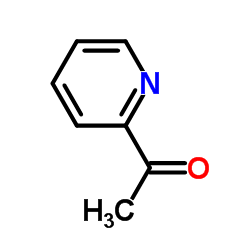

 CAS#:922506-46-5
CAS#:922506-46-5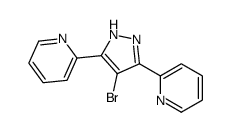 CAS#:922506-47-6
CAS#:922506-47-6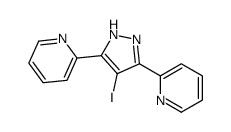 CAS#:922506-48-7
CAS#:922506-48-7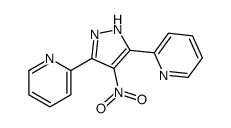 CAS#:922506-49-8
CAS#:922506-49-8